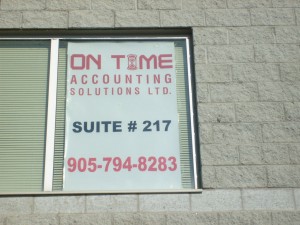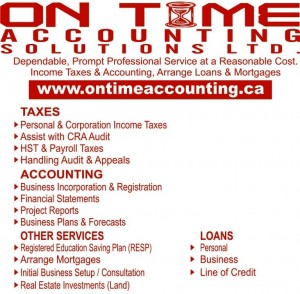Tax Tips By Accountant in Brampton
• An overtime meal allowance of up to $17 for two or more hours of required overtime adjacent to regular working hours, if the overtime is infrequent or occasional (generally once or twice a week, outside of peak periods). If you are working at a temporary site, some expenses associated with travelling and working at that site might not be taxable if they apply for a reasonable and determinate period of time — e.g., a week, a month or a year — generally up to about a two-year maximum (although this could vary), and there is a scheduled date of return to your regular place of employment.
• The cost for distinctive uniforms, protective clothing or footwear required to be worn during employment, including related laundry expenses in Brampton.
• Reimbursement of moving expenses upon relocation according to Accountant in Brampton.
• Receipt of non-cash gifts and awards (e.g., for Christmas, wedding, birthday) in one year to an arm’s length employee (e.g., not a proprietor, shareholder or their relatives), for certain material items and under certain conditions, up to a total value not exceeding $500, including all applicable taxes by accountant at Brampton.
• Receipt of a separate non-cash long-service/anniversary award of a material nature up to $500 in total value, including applicable taxes, provided such an award is for at least five years of service, or it has been at least five years since the last such service award was presented in Brampton.
• Employer-sponsored special events, such as dinners or other activities for all employees, are not taxable to individual employees, as long as the total cost for that event does not exceed $100 per person.
• Use of the employer’s recreational facilities, or employer-sponsored membership in a social or athletic club, where such membership is considered all or primarily beneficial to the employer (despite the employer not being able to deduct the cost of such fees) according to Accountant in Brampton. The CRA has ruled that there is no taxable benefit to you if your employer TIP arranges for the purchase of a discounted fitness pass membership from a third party by accountant Brampton.
• An employer-mandated medical examination required as a condition of employment.
• Employer-sponsored personal counseling services in respect of the mental or physical health of an employee or a person related to an employee, or concerning re-employment or retirement.
• Employer-sponsored travel where the trip was undertaken predominantly for business reasons in Brampton.
• Employer-sponsored transportation to a work site where public or personal vehicles are not permitted – e.g., with respect to security or other reasons.
• Work-related employer-sponsored training costs.
• Tuition and related fees, if the course is required for employment and is primarily for the employer’s benefit by accountant Brampton.
• A reasonable per kilometer automobile allowance.
• Meal expenses, if required to be away from the employer’s municipality on company business for at least 12 hours.
• Board, lodging and transportation to a special worksite involving duties of a temporary nature, or to a remote worksite venue away from the general community where an employee is required to be a reasonable distance from the principal residence for at least 36 hours.
• A reasonable employer-provided allowance for an employee’s child to live at and attend the nearest suitable school, if one is not close to where the parent must reside for employment purposes. If you are awarded a gift through your company’s social committee, and that
committee is not funded or controlled by your employer, the gift is generally considered to be non-taxable. However, if that committee is funded or controlled by the employer, it is generally considered a taxable benefit in Brampton. If your employer provides you with an allowance to purchase an electronic device (e.g., a tablet computer) for use at work, this amount is generally considered a taxable benefit. To avoid this, consider transferring ownership of the device to the employer and ensuring that any personal use is incidental by accountant in Brampton.
• The value of scholarship awards provided by an employer for the benefit of the spouse and/or children.
• Employer paid expenses for moving employees and family, along with household effects, out of a remote location upon the termination of employment.
• Exclusive on-site child-care services provided by employers to all employees for minimal or no cost.
SPECIAL CONSIDERATIONS RELATED TO TAXABLE AND NON-TAXABLE EMPLOYMENT INCOME
Other current issues with respect to the taxability and non-taxability of employee benefits include, but are certainly not limited to, the following points:
• An employer-provided computer and internet service might not represent a taxable benefit under certain circumstances if employees require such a service to carry out their business obligations; however, the costs associated with purchasing an employer-funded computer that is also used for personal reasons would likely result in a taxable benefit.
• Taxpayers who receive an arbitration award from their employer for reasons such as a collective agreement breach to compensate for lost wages, or receive retroactive payments as a result of a decision such as pay equity — a component of which might constitute damages — should consult an accountant in Brampton to determine the appropriate tax treatment for that payment.
• In some cases, the courts may be more lenient toward an employee than a shareholder in terms of any benefit amount deemed to be non-taxable. For instance, employees might be able to exclude 100 per cent of membership fees in a golf club if the membership is primarily for the benefit of the employer. On the other hand, corporate shareholders might have to apportion the tax-exempt and taxable portion of the fees between business and personal use, respectively. Taxpayers — especially those with dual employee/shareholder roles — should clarify the proper tax treatment with their accountant in Brampton.
• Although child-care expenses that have been paid for by an employer are generally considered a taxable benefit, if an employee is required to travel out of town on employment-related business and, as a result, incurs additional child-care expenses that are reimbursed by the employer, that amount will not be a taxable benefit.
• Where an educational institution provides subsidized or free education to an employee or to the spouse or children, the CRA’s position is that the fair market value of that tuition must be included in the employee’s income, with the difference between that and the discounted tuition being a taxable benefit. The courts generally follow this same fair market approach when assessing the value of employee benefits, but have sometimes used other valuations.
• If a spouse accompanies an employee on a business trip, and the employer reimburses these travel expenses, that payment is a taxable benefit to the employee unless the spouse was engaged primarily in business activities on behalf of the employer during that trip according to accountant in Brampton.
• Certain accumulated personal credit arising from loyalty incentives (e.g., frequent flyer programs during business trips) are taxable to an employee and included in income, especially when a company credit card was used. However, in other instances and under certain circumstances involving a personal credit card, such as points accumulated through loyalty programs, it may be non-taxable.
• Certain members of the clergy or religious organizations are entitled to exclude from income reasonable allowances with respect to transportation expenses incurred while discharging their duties.
• Employer-provided benefits to employees with a disability, such as transportation costs, including parking, are generally not taxable by accountant in Brampton.
• An employee life and health trust (ELHT) has been established by the federal government which, if such a plan is offered by the employer, could have tax implications in terms of providing either taxable or non-taxable benefits for certain employees under certain conditions.
For more information please see your accountant at Brampton or call 905-794-8283.
Tax Tips by an Accountant in Vaughan
The 2013 federal budget introduced a temporary First-Time Donor’s Super Credit (FDSC), effective for donations made on or after March 21, 2013. First-time donors are eligible for a 40 per cent tax credit (15 per cent + 25 per cent) for their first $200 in donations, and a 54 per cent credit (29 per cent + 25 per cent) for donations in excess of $200, up to $1,000. First-time donors are defined as such if neither they nor their spouse or common-law partner claimed the donation tax credit for the previous five taxation years according to Accountant in Vaughan.
Ontario Provincial
INCREASED THRESHOLD FOR All INCOME TAX BRACKETs
The taxable income thresholds in all three Ontario provincial tax brackets were increased by 1.8 per cent in 2013, reflecting changes to Canada’s consumer price index (CPI) in Ontario. All indexed non-refundable tax credits also increased by 1.8 per cent in Vaughan.
HIGH INCOME TAX BRACKET CHANGE
The Ontario government introduced a high tax bracket in 2012. In 2013, individuals will be taxed at a rate of 13.16 per cent for the portion of their taxable income in excess of $509,000, up from 12.16 per cent of $500,000 in 2012.
TAXABLE BENEFITS DERIVED FROM EMPLOYMENT INCOME
The value of most benefits derived from employment is included in personal income. Among the myriad benefits which, generally, must be included in income are the following:
• Tips and gratuities must be reported as income, even though they may not necessarily be included by employers on the employee’s T4 slip Statement of Remuneration Paid.
• Employees who are awarded near cash merchandise, such as a gift certificate,
must take the fair-market value of that award into account as taxable income.
• Subsidized long-term accommodation provided by an employer for the employee’s benefit.
• Employees or ex-employees who receive periodic payments under a disability insurance plan, sickness or accident insurance plan or income maintenance insurance plan to compensate for loss of income from an office or employment must include that amount in income if the plan’s premiums were paid by the employer; however, they may deduct from income any amount they may have personally contributed toward such a plan. Annual premiums paid by an employer to a group sickness or accident insurance plan are also taxable starting in 2013.
• Employees who exercise an option to purchase an automobile from their employer at less than its fair-market value (FMV) are considered to have received a taxable benefit for the difference between the price paid and FMV. TAX Flexible employee benefit programs, which allow employees to custom-design their own package of health and other benefits, are popular in the workplace. Take care when structuring such plans, however, because taxable benefits can result. If, for example, an employee accumulates flex credits and those benefits are received in cash, that amount is generally considered taxable income by Accountant in Vaughan.
Always keep independent track of your earnings. Don’t rely totally on the receipt of earnings slips such as T4s. Failure to accurately report income could result in substantial penalties according to Accountant in Vaughan.
NON-TAXABLE BENEFITs DERIVED FROM EMPLOYMENT INCOME
Although the majority of benefits derived from employment must be included in personal income, there are several exceptions. These include, but are not limited to:
• Ordinary discounts on the employer’s merchandise, available to all employees on a non-discriminatory basis.
Subsidized meals available to all employees, provided a reasonable charge is made to cover direct costs.
There are also other ways you can save tax dollars by your accountant at Vaughan, for more information please call 905-794-8283.
Tax Tips by Accountant in Bolton
- Your RRSP will be charged a one per cent penalty tax for every month that your foreign content exceeds 30 per cent of its book value. To provide a cushion against accidentally exceeding this limit, you may want to keep your foreign content below 30 per cent according to accountant in bolton.
- Special mutual funds use derivatives to replicate the performance of foreign mutual funds and international stock indices. They are not considered to be foreign property. As a result, the holder of such funds can effectively increase their foreign investment exposure to 100 per cent of their RRSP. Consult your accountant in bolton before investing.
- In cases of hardship, locked-in funds can sometimes be withdrawn. The administrator of your plan or a accountant in Bolton can advise you of the rules that are applicable in Ontario.
- When deciding whether to convert your RRSP into a RRIF, retirement annuity or a combination of both, there are a number of factors to consider. If you are holding a RRIF, for instance, you are able to remain active in making investment decisions. With an annuity, however, you are transferring autonomy of the underlying investment portfolio to financial professionals who, in turn, assume the risk and provide you with a steady income for a fixed period of time or the rest of your natural life. Also, while you can convert all or part of your RRIF funds to a retirement annuity at any time, once annuities have been established, they are permanent. If you’re receiving Old Age Security pension guarantee income supplement, any income you earned through RRSP or RRIF will affect your Old Age Security guarantee income supplement. Please ensure you withdrawal all your RRSP and RRIF before you receive Old Age Security pension in order to receive maximum benefits of pension by Accountant in Bolton.
- The CRA now recognizes registered pension plans that provide survivor benefits to same sex partners.
- Legal fees incurred to establish child support are deductible. Should a portion of the legal fees paid in a divorce settlement be for obtaining child support, the onus is on the taxpayer to establish that proportion of directly related fees. Once a settlement with respect to child support has been established, however, the legal costs associated with a subsequent court challenge to change that amount cannot be deducted for tax purposes.
- Legal costs incurred to enforce pre-existing rights to interim or permanent support amounts or to defend against the reduction of support payments (whether child support or otherwise) are both deductible, provided they are not incurred against an estate by accountant in bolton
- Legal fees incurred in establishing the right to spousal support amounts are not deductible because such costs are for personal or living expenses by accountant in Bolton.
- The cost of summer day camps and sports schools may also qualify as deductible child care expenses depending on factors such as the child’s age, the program’s sophistication and whether such expenses are incurred to allow the parent or supporting person to carry on earning a living. This could also be claimed as Children Fitness Tax credit up to $500 per child.
- Although supporting parties must be earning a living in order to deduct child-care expenses, this deduction might still be available during periods in which temporary, extenuating circumstances, such as a strike or other labour stoppage, prevent you from working.
- For more information please see your Accountant at Bolton or call us at 905-794-8283.
Tax Tips Accountant at Woodbridge
- Both spouses/common-law partners must file an income tax return in order to receive the CCTB. Income earned from benefit payments invested in the child’s name will not be attributed back to the parents by Tax Accountant at Woodbrige.
- Obtain the benefit of tax shelter deductions in advance. Apply to your CRA district taxation office for permission to reduce income taxes at source to reflect tax shelter deductions.
- If you have a shortage of cash, consider borrowing to invest in an LSVCC RRSP. If you were in the highest tax bracket 46.41, your tax savings from a maximum $5,000 investment would be $2,321 from the RRSP plus $1,500 from the LSVCC tax credits, for a total tax saving of $3,821. You can then use your tax savings to repay most of the loan according to your neighborhood Accountant in Vaughan.
- If you own units of a LSVCC purchased in 1995 or earlier, check the terms of your fund. In some cases it may be possible to redeem the units of a fund and reinvest them in the same fund (or another one) to obtain another tax credit. Under federal rules, fund units must be held for a minimum of five years,or eight years. The equivalent provincial rules vary by jurisdiction. Also, before redeeming your units, be sure and check the terms under the prospectus of the fund you purchased as redemption fees imposed by the fund company may also apply.
- Contribute to your RRSP early in the year. If, for example, you contribute $13,500 at the beginning of the year instead of at the end, over a 28-year period, assuming an eight per cent rate of return, you would have an extra $100,000 in your RRSP by Tax Accountant in Woodbridge.
- If you don’t have enough cash to top up your RRSP, consider making a contribution in lieu of cash, or ‘in kind’ as it is commonly phrased. The asset transferred must be a qualified investment. These may include publicly listed stocks (and some privately listed stocks if they are held at arms-length), corporate and government bonds, debentures and similar obligations. Be careful when transferring investments that have declined in value, because that loss will be ignored for tax purposes. Consult your senior accountant at Woodbridge for great advice.
- Individuals with low earned income that precludes their owing any tax should still consider filing a tax return in order to create RRSP contribution room for future use via Accountant at Woodbridge.
- If you are an employee who is making regular RRSP contributions, request that the amount of income tax withheld on your paycheque be reduced in order to reflect the savings those contributions will bring. This is a more efficient way to manage your money than overpaying tax up front, then waiting for a refund the following year.
- You don’t have to deduct an RRSP contribution the year in which it is made; instead, you can carry it forward for deduction in a future period when you have income placing you in a higher tax bracket. Be sure you have utilized all personal tax credits before deducting your RRSP contribution according to your local tax accountant at woodbridge.
- If you have both a regular and a spousal RRSP and are the annuitant for each, you can transfer the proceeds of one plan into the other prior to maturity if you believe that will provide certain advantages, such as administrative ease. The combined new plan would then be classified as a spousal plan.
- Beware of the tax consequences when transferring investments to your RRSP. The CRA treats such transfers as being similar to a sale of the investment. Moreover, while deemed capital gains triggered by a transfer to an RRSP are taxable, deemed capital losses are not deductible. So instead of transferring a money-losing investment to your RRSP consider selling it, then contributing the cash to your RRSP and repurchasing the investment within the RRSP. This will crystallize your capital loss.
- For more information please see your Tax Accountant at Woodbridge or call us at 905-794-8283.
Tax Tips by Accountant in Caledon
- A capital loss on shares of a company listed on the former Canadian Dealing Network, now Tier 3 of the Canadian Venture Exchange (CDNX), might qualify for ABIL treatment if you can establish that the company has not elected to be treated as a public corporation for tax purposes.
- An election under the Income Tax Act to claim a loss on debt or shares of an insolvent company applies to claiming capital losses even where the company is (was) public.
- Carrying charges for purchasing Canada Savings Bonds (CSBs) through a payroll deduction plan are eligible for the interest expense deduction by Accountant in Caledon.
- A taxpayer can deduct fees (but not commissions) paid for advice received with respect to the purchase, sale and administration of specific investments, such as shares or securities, provided those fees are paid to a professional whose principal business involves managing such investments.
- If you earn more than your spouse, you could reduce your family’s combined tax bill by paying your spouse’s expenses, thus allowing them to save their money for investment purposes. The income and gains from these investments would then be taxed in your spouse’s hands at their (presumably lower) tax rate. This strategy will also help you even out future retirement income if you have been able to invest in a tax deferred retirement plan and your spouse has not.
- If you earn less than your spouse, keep a clear record of the source of your investment funds to ensure that your investment income is attributed to you. This could be accomplished by, for instance, depositing your personal income into a separate bank account rather than a joint account. Then those funds could be used to make investments in your name.
- If you loan your spouse or common-law partner funds, with interest payable at least annually at the lesser of prescribed or commercial rates, and your spouse/common-law partner invests those funds to achieve a yield exceeding the rate of interest you charged, that excess income will be taxed in your spouse/common-law partner’s hands according to Tax Accountant in Caledon.
- A loan may be preferable to an outright transfer, since after realizing the gain the transferee could repay the loan and keep the gain, free of future attribution. If cash is not readily available, consider lending investments.
- Loans to family members, if used in an active business, will not result in attribution of the proceeds of any subsequent business income or gains.
- Parents often contribute to investment accounts held in trust for their children. To avoid attribution of capital gains in that instance, care should be taken that such “in trust for” accounts qualify as irrevocable trusts. To qualify, the terms and conditions of the account must serve to divest, deprive or dispossess the parents of title to deposited funds. If the parent has the right to withdraw those funds for their personal benefit, the account will not qualify as an irrevocable trust.
- If you and your spouse or common-law partner is receiving approximately the same level of benefit prior to an assignment, splitting CPP benefits will not likely be worthwhile. But if one partner receives greater benefits and has a higher taxable income than the other, you may achieve some advantage.
- For information please call your Tax Accountant in Caledon at 905-794-8283.







